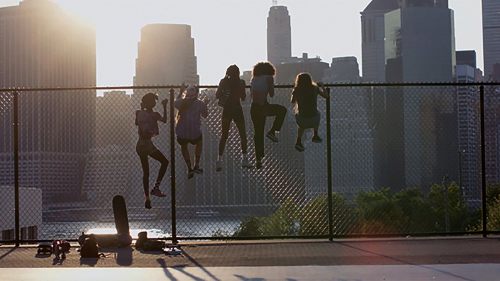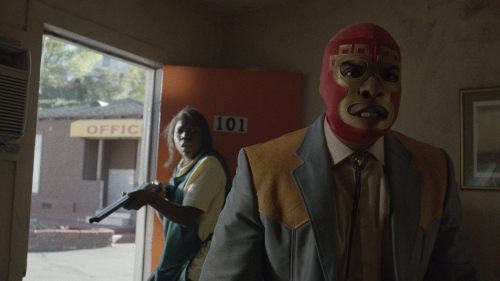The Universal Appeal Of TANGERINE
The Florida Project hits theaters tomorrow. Get your tickets here!
Tangerine is aptly titled, bursting as it is with bright, sunshine-y, bittersweet orange. The whole thing looks like it could've been shot at magic hour, its final confrontation taking place amidst the neon glow of Donut Time – even at night-time, the colours bust through.
Sean Baker's groundbreaking movie, rightfully revered as a milestone in LGBT filmmaking, has been described variously as a "transgender revenge story" and "like nothing you've ever seen before". IMDb reckons it's a crime, comedy and a drama all rolled into one.
What Tangerine absolutely isn't, however, is an Oscar-baiting, "woke" message movie. Rather than a near-anorexic Jared Leto strutting around in stilettos using a baby voice, Baker casts two transgender actors of colour in the lead roles, giving the movie a slick of realism that bleeds into every Technicolor corner.
Ostensibly about some of the most marginalised, forgotten members of society – think of how shopkeepers and passers-by ignore Dinah's screams for help as she's dragged through the streets by her hair, or the nonchalant cop who calmly tells a warring Alexandra and client to get off his car – the heart of the movie is concerned with the universal truth of friendship. It's an ordinary story in an extraordinary skin.
Plenty of films claim the "slice of life" label but this is so close it might as well be a documentary. In fact, if it wasn't for the urgent, beat-driven soundtrack (which ramps up, getting faster the madder Sin-Dee is), Tangerine could easily be mistaken for one. It's almost like Baker has strapped a camera to his firecracker lead and just let her run riot through the streets of L.A.
Much of the pre-release discussion focused on the movie's punk rock shooting style, which utilised, of all things, an iPhone. Critics appealed to readers not to think of it as "the iPhone movie." All anybody needed to do to be convinced, naturally, was watch the thing. Sure, it's shot on the hop, often as though Baker is literally a fly on the wall, watching normal life unfold, but nothing about it says low budget or amateur.
Notably, the director, and co-writer, doesn't present his story as a "trans story." Rather, this is a simple tale of a big misunderstanding between two friends (Alexandra thinking Sin-Dee is about to dump Chester when exactly the opposite is true) leading to a hilariously over the top reaction.
Rather than signposting how capital-I important it is, Baker leaves us to draw our own conclusions. His story is presented without prejudice, without judgment. The intention is to showcase an isolated section of society, to show how much we all have in common, rather than to make the members of it seem even more different.
Sin-Dee and Alexandra have the easy rapport of lifelong friends, because that's exactly what they are, actresses Mya Taylor and Kitana "Kiki" Rodriguez scouted by Baker at an LGBT centre in LA. By giving them the space to tell their own (fictionalised) stories, which he worked out with them closely, Baker gives Tangerine an authenticity missing from the likes of The Danish Girl or Dallas Buyers Club, both of which included trans characters, played by non-trans actors, as ostensible leads but didn't give them the focus or the autonomy to drive the story. Naturally, both also scored big with Oscar.
It helps enormously that Sin-Dee, Alexandra and the plethora of personalities they meet on their jaunt through the streets are fully-realised characters in their own right, the kind of people most of us walk past without noticing. Baker offers a spotlight without making them accessories to the real protagonist's struggle, or freaks trotted out to be pointed at.
The two leads complement each other enormously, too, so it's easy to invest in their relationship. Sin-Dee's caustic wit ("God gave me a penis") undercuts the movie's more plaintive moments, but Alexandra is her quiet, calm opposite. As Sin-Dee goes off like a tornado in human form, Alexandra remains cool always.
Alexandra isn't lying when she says it's all about their hustle, either, particularly when it comes to the revelation that she betrayed her best friend. Tangerine has an outwardly sunny disposition, but the brash brightness could be considered a cover up, a way to put a smile on a difficult situation, much like the wig Alexandra offers Sin-Dee after her own is ruined.
Seemingly throwaway lines like "what family?" highlight the movie's bittersweet core, that aftertaste suggesting when all is said and done, these ladies are still going to have to get up tomorrow and get back on the grind again the only way they know how.
It's worth noting that, of the final shots of each character – Razmik sitting alone in his living room, Dinah waiting outside a motel room alone in the cold, Sin-Dee and Alexandra in the Laundromat – only Sin-Dee and Alexandra are together, silhouetted in a halo of fluorescent light, protected from the darkness outside. The film fades to black as they reach for each other's hands and share a knowing, small smile. They've been through a lot, and there's surely more hardship to come, but once they have each other, there is still hope.
Tangerine is achingly, bracingly, slap-you-in-the-face real, painfully raw and funny in the most bittersweet way. But it doesn't capture your heart just because Baker is showcasing lives not often seen onscreen (though this is, obviously, important too), but because it presents the easiest idea to empathise with: a long-term friendship shared between two people just trying to get by.
In the orange glow of Los Angeles, their brightest lights are each other.



